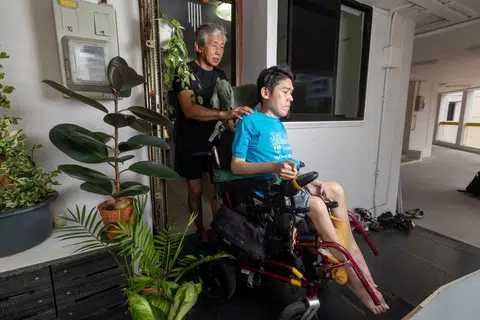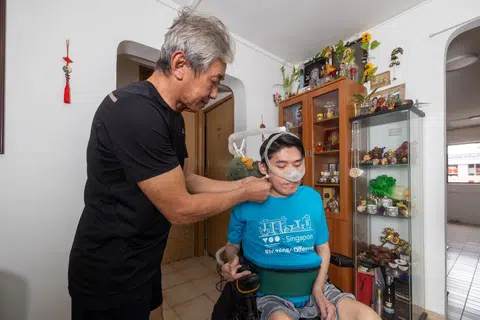He quit his career to care for his son who has muscular dystrophy
Childhood falls were an ordeal for Mr William Eng.
Unlike other children, he could not brush off a routine tumble. While he remembers running in primary school, he tiptoed as he walked. Unbeknown to him, his unusual gait was a symptom of muscular dystrophy, a condition in which muscles weaken over time.
Mr Eng, now 37, recalls: "I fell easily and frequently. I wasn't afraid of falling down, but getting back up was tiring. Initially, I could get up on my own. But by secondary school, my friends had to pull me up from behind."
He found out, through medical checks ahead of registering for national service, about his muscular dystrophy at the age of 15.
Before that, he and his family had cycled through unsuccessful attempts at managing his symptoms, including acupuncture; making him consume brews with ingredients from traditional Chinese medicine like seahorse and frog legs; and sporadic visits to the hospital.
Mr Eng says they did not know they had to seek treatment in any regular way. "We didn't know where to go."
The eldest of four children, he lives with his 59-year-old father Steven Eng, who is his full-time caregiver; his stepmother, a 56-year-old cashier; and an uncle, 58, who works part-time as a cleaner. His younger brother and sisters, aged between 25 and 36, do not live with them.
From Mr William Eng's teenage years, his dad has been a bulwark of support as their family grappled with his condition.
He was about to repeat Secondary 3 because he did not take his examinations for that grade the year before. But he could not walk by then, and dropped out of school.
Thus began a period of social isolation that lasted around 14 years. Although he soon acquired a manual wheelchair through a family friend, lifts would not be installed at his family's HDB block in Tampines for several years.
On outings, his father would carry him down the four flights of steps from their three-room flat on the third floor; seat him at the coffee shop downstairs; and walk to the main road to hail a taxi for them, retracing that route upon their return.
During this time, Mr William Eng says he had "no peers", save for one secondary school friend who visited him faithfully. His late paternal grandmother, who used to live in their household, was his main carer for many years.
When his siblings grew older, they would leave him food and water on the table before they left for the day, bringing him a dabao (takeaway) meal when they got home.
Mr Steven Eng was working as a contractor, specialising in signage painting and facilities maintenance. For close to 20 years, he woke at 5.30am for work, returning in the evening and spending limited time with his disabled son.
For a year in the 1990s, he worked in construction by day and held a night job making soya bean milk at a factory. Money was tight and he slept about three hours a day.
When Mr William Eng was 29, he came into contact with Muscular Dystrophy Association (Singapore) and spent most days of the week at its Bishan location.
Equipped by then with a motorised wheelchair which afforded him more mobility and independence, he filled his days with activities such as therapy, art and craft, and sports like powerchair football, in which players use specialised electric wheelchairs to play a modified form of the sport.

He also spent several years designing greeting cards and labels for work projects gained through the association.
But a health crisis struck on Christmas Eve 2019, further weakening him and prompting his father to give up his career to care for him.
Mr William Eng was rushed to hospital with high fever, a hacking cough, pneumonia and a congested lung.
During his 2½-month stay at Tan Tock Seng Hospital, which included about a month in intensive care, he underwent intubation, whereby a breathing tube is inserted; and subsequently a tracheotomy, which creates an opening through the neck directly into the trachea or windpipe, to provide an airway and remove secretions from the lungs.
Mr Steven Eng sprang into action, taking leave from work to alternate 12-hour shifts at his son's hospital bedside with other family members.
When Mr William Eng could not speak for a few weeks, his father, who cannot write in Chinese or English, used a board with letters and numbers to decipher what he needed. The younger Eng would nod or train his eye at one letter after another, forming words like "pain" for his father to write on paper, indicating to hospital staff what help was needed.

The decision to care for his son full time was easy for the senior Eng. "I told the hospital, please let me take care of my son. I can provide one-on-one, 24-hour care. Rather than having a helper or one of his siblings help out, I might as well do it. I am old (and can give up my work)," he says in Mandarin.
He quit work on New Year's Day in 2020.
For the past five years, Mr Eng has been helping his son with daily activities such as going to the bathroom, showering and clothing him, and giving him medicine. He also puts on a ventilator for the younger man, who uses this machine that helps him breathe when he sleeps at night, and for a few hours in the afternoon.
He helps his son use a cough assist machine, which clears his airways and supports his breathing by removing phlegm from his lungs.
Mr Eng works out for an hour daily, stretching and using dumbbells, to keep up his strength so he continues to be able to carry his son when necessary.
The pair, who enjoy watching movies together, attest to their close relationship.
Mr Steven Eng says: "We are friends, we speak directly to each other." He adds: "It's not tiring caring for my own child."
Mr William Eng demurs. "My father toils the most. He has sacrificed a lot. Especially in Asian society, people might ask, why aren't you working? It's rare to find a daddy caregiver."
"I call him Penguin Daddy," he says, referring to how the male emperor penguin incubates the egg while the female goes away to hunt at sea.
- Mr William Eng is supported by Tan Tock Seng Hospital through its services and the TTSH Community Fund, which has provided him with medical equipment - a hospital bed, suction machine, ventilator, oxygen concentrator and cough assist machine - to enable him to be cared for at home. As part of SG60 efforts, the TTSH Community Fund is holding a fund-raising campaign, This Simple Dream Of Mine, which aims to raise $180,000 to support its patients. For more information, go to for.sg/ttshsimpledream
Venessa Lee for The Straits Times